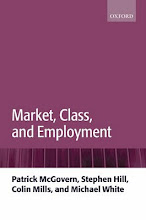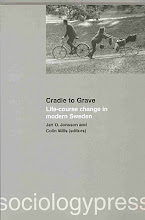Referring to the first half of the Nineteenth Century, David Vincent in his Literacy and Popular Culture makes the observation that though book ownership amongst ordinary people was: "...surprisingly widespread, literature was more often inherited than bought, and more often neglected than read." More than 100 years after the period he was writing about, the same thought rather nicely characterizes my own childhood relationship with the the physical artifacts of the word. The few grown-up books that found a resting place in our house were not things that you put on bookshelves, which is just as well, because we didn't have any bookshelves. My mother's opinion was that books were a species of clutter, sure to "collect dust" and therefore had to be consigned to a drawer or, even better, to the cupboard my father had built into one of the bedroom chimney breasts. There they were rendered almost inaccessible by the large ottoman containing spare bed linen that was positioned in front of it.
If one succeeded in moving the obstruction one was confronted with a patrimoine without much discernible survival logic other than natural selection. Of course the origin of much of the stuff was quite clear - improving books awarded as Sunday school prizes being the largest category. Thus in addition to the several small black Bibles one could find: Charles Reade's The Cloister and the Hearth (1861) - the uncut pages of which confirmed Orwell's observation that "...it is unusual to meet anyone who has voluntarily read him" and Charles Kingsley's The Heroes (1856) - a children's version of the more popular Greek myths which the 11 year old CM rather enjoyed. The sole concession to the literature of the modern period was Wells' The First Men in the Moon (1901) - awarded as a Boy's Brigade attendance prize to my father in the 1940s. It showed no signs of ever having been read.
Moving onto the non-fiction list there was: Alfred E. Lomax's Sir Samuel Baker: Hunter, Explorer, Administrator (1894); John Hunt's The Ascent of Everest (1953); A. Walker's The Big Walk (1961); Sir Ernest Gower's The Complete Plain Words and J. A. C. Brown's The Social Psychology of Industry. The latter two were probably purchased when my father took a night school class in office administration but judging by the the unmarked pages and unbroken spines - they now sit on a shelf in my own office - they haven't been referred to in the last 50 years. In addition to these there was the odd ready reckoner, a couple of ancient engineering books acquired by my father from the second engineer of one of the ships he sailed on and a small, well thumbed paperback, long lost, on the writing of business letters. Last, but by no means least, was the self-improving The Awful Mathematician's Book, 56 pages of formulae and rules which helped me pass O level mathematics. I certainly wouldn't have passed if I had had to rely solely on what was laughingly called mathematics teaching at my school.
In a separate category I should list two books that had been lent to my parents by friends or acquaintances. For reasons that remain obscure to me these were kept in a small cupboard that was built into the combined telephone table/stool that sat by the front door. Perhaps the idea was that it would be handy to have them there for when their respective owners returned to collect. One of the temporary accretions to our cultural capital was Amos Oz's Catch the Water Catch the Wind, the other a paperback called, if I remember correctly, The Cross and the Switchblade. Of course neither was read by my parents and the former was in fact never returned to its rightful owner and I have become its custodian.
The only book I have any positive memory of my father reading was Mario Puzo's The Godfather. Parts of it had been serialized in the newspaper and he probably wanted to know how it ended. Whether he ever finished it I don't recall. Until I was in my late 20s I don't think my mother read anything apart from newspapers - The Daily Mail, Coventry Evening Telegraph, The Sunday Post - and the DC Thompson staple The People's Friend. Later in life she acquired a taste for Jacquie Collins and Catherine Cookson and, mellowing with age, took to displaying a row of paperbacks on her living room dresser. Once she surprised me by reading and enjoying Angela Carter's Heroes and Villains which I had absently mindedly left behind after a visit. Here, at least, she was at one with advanced opinion: though, alas, an opinion I didn't share.
In a separate category I should list two books that had been lent to my parents by friends or acquaintances. For reasons that remain obscure to me these were kept in a small cupboard that was built into the combined telephone table/stool that sat by the front door. Perhaps the idea was that it would be handy to have them there for when their respective owners returned to collect. One of the temporary accretions to our cultural capital was Amos Oz's Catch the Water Catch the Wind, the other a paperback called, if I remember correctly, The Cross and the Switchblade. Of course neither was read by my parents and the former was in fact never returned to its rightful owner and I have become its custodian.
The only book I have any positive memory of my father reading was Mario Puzo's The Godfather. Parts of it had been serialized in the newspaper and he probably wanted to know how it ended. Whether he ever finished it I don't recall. Until I was in my late 20s I don't think my mother read anything apart from newspapers - The Daily Mail, Coventry Evening Telegraph, The Sunday Post - and the DC Thompson staple The People's Friend. Later in life she acquired a taste for Jacquie Collins and Catherine Cookson and, mellowing with age, took to displaying a row of paperbacks on her living room dresser. Once she surprised me by reading and enjoying Angela Carter's Heroes and Villains which I had absently mindedly left behind after a visit. Here, at least, she was at one with advanced opinion: though, alas, an opinion I didn't share.








